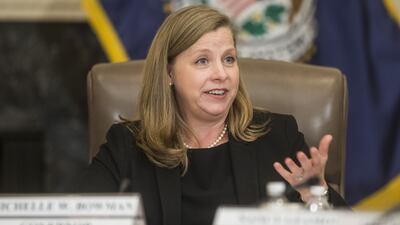The lone dissenting member of the US Federal Reserve's 50-basis point cut called for a more measured approach to cutting interest rates, suggesting that beginning with such a strong action could send the wrong message on inflation.
Michelle Bowman became the first Fed governor since 2005 to dissent on a monetary policy decision when she voted against the 50-basis point cut on Wednesday. She favoured a quarter-point cut instead.
The Fed's decision lowered its benchmark rate to 4.75 per cent, from 5 per cent. The median Fed official pencilled in two more quarter-point reductions this year, according to its updated economic projections.
In a statement issued on Friday, Ms Bowman acknowledged it was appropriate to begin lowering rates given the progress made in tackling inflation but worried that moving too quickly could reignite demand.
“I see the risk that the committee's larger policy action could be interpreted as a premature declaration of victory on our price stability mandate,” she said.
“I believe that moving at a measured pace towards a more neutral policy stance will ensure further progress in bringing inflation down to our 2 per cent target.”
Ms Bowman, considered to be one of the more hawkish members on the Federal Reserve Board, has publicly voiced her doubts about the status of the Fed's inflation battle. As recently as August, she expressed her view that inflation remained “uncomfortably above” the Fed's 2 per cent goal.
Earlier on Friday, Christopher Waller, one of the other seven Fed governors, said recent data shows inflation may have been running below the Fed's 2 per cent target over the last four months ending in August. In an interview with CNBC, he estimated the Fed's preferred inflation metric is running at less than 1.8 per cent.
“What’s got me a little more concerned is inflation is running softer than I thought,” he said.
Dissents have been rare during Fed Chairman Jerome Powell's tenure. After Kansas City Fed president Esther George dissented on the size of an interest-rate increase in June 2022, the Fed enjoyed a long streak of unanimity on policy decisions until this week.
They can potentially undermine the effectiveness of the Fed's leadership, while others argue dissents can help break up the central bank's groupthink.
Mr Powell played down the dissent during his news conference on Wednesday, telling reporters that all 19 participating members in this week's meeting forecast several rate cuts this year.
“There is a dissent, and there's a range of views, but there's actually a lot of common ground as well,” he said.


















